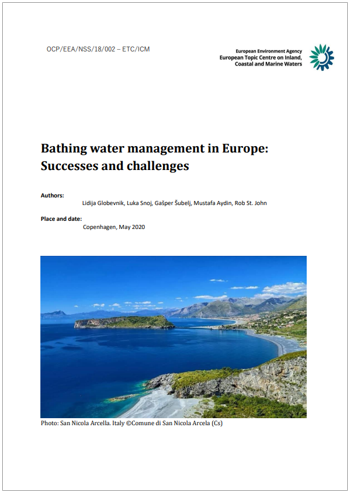Regolamento (CE) n. 303/2008
Regolamento (CE) n. 303/2008 della Commissione, del 2 aprile 2008 , che stabilisce, in conformità al regolamento (CE) n. 842/2006 del Parlamento europeo e del Consiglio, i ...

EEA, 2020
Swimming is consistently among the top public outdoor recreational activities in Europe and has numerous positive effects on human health and psychology. Bathing sites are often very attractive tourist destinations. The need to protect and improve bathing water quality in both marine and freshwater environments is thus a key issue for policy makers and environmental managers.
For decades, European countries have shared a common vision to sustain good quality bathing waters. Efforts to achieve this target have been prompted and supported by the Bathing Water Directive, introduced in 1976. The Bathing Water Directive (BWD) was revised in 2006. The update was based on up-to-date scientific evidence on the most reliable indicator parameters for predicting microbiological health risk for designated European bathing waters. In addition, the updated BWD simplified its management and surveillance methods.
The bathing season in Europe usually lasts from May to September. During that time, local and national authorities take bathing water samples and analyse them for the types of bacteria which indicate pollution from sewage or livestock (e.g. Escherichia coli and intestinal enterococci). Based on the levels of bacteria detected, bathing water quality is then classified as ‘excellent’, ‘good’, ‘sufficient’ or ‘poor’.
All European Member States make great efforts to improve the quality of existing bathing waters, to provide up-to-date information on their state to the public, and to make bathing feasible in urbanised and formerly heavily polluted surface waters. Significant investments in urban waste water treatment plants, improvements in sewage networks and other measures have contributed to a reduction in ‘poor’ bathing water quality in more than 3000 large cities in Europe. Safe bathing is now possible in many European capitals – including Amsterdam, Berlin, Budapest, Copenhagen, London, Riga and Vienna, – a feat that would have been unimaginable in the 1970s.
Thanks to successful environmental policy and management guided by the BWD, the percentage of European bathing waters achieving at least ‘sufficient’ quality (the minimum quality standards set by BWD)increased from just 74% in 1991 to over 95% in 2003, and has remained quite stable since then. The percentage of bathing waters at the highest water quality (classified as ‘excellent’) has increased from 53% in 1991 to 85% in 2019. Thanks to common European action, more than eight out of ten of Europe’s monitored bathing waters now have ‘excellent’ water quality.
Fonte: EEA
Collegati:
Regolamento (CE) n. 303/2008 della Commissione, del 2 aprile 2008 , che stabilisce, in conformità al regolamento (CE) n. 842/2006 del Parlamento europeo e del Consiglio, i ...
Conversione in legge, con modificazioni, del decreto-legge 4 dicembre 1993, n. 496, recante disposizioni urgenti sulla riorganizzazione dei controlli ambientali e istituzion...
Disciplina sanzionatoria per la violazione delle disposizioni derivanti dal Regolamento (CE) n. 1005/2009 sulle sostanze che riducono lo strato di ozono.
(GU n.227 del 2...
Testata editoriale iscritta al n. 22/2024 del registro periodici della cancelleria del Tribunale di Perugia in data 19.11.2024